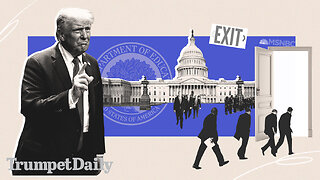Premium Only Content

The rise of #AI has raised #ethical and #regulatory #concerns, with issues such as copyright infring
The rise of #AI has raised #ethical and #regulatory #concerns, with issues such as copyright infringement, #algorithmic #bias, #cybersecurity dangers, and "hallucinations" dominating the conversation. However, proposed solutions have little to no legal traction. This raises questions about whether AI will be a repeat of social media where ethics concerns and attendant rules stagnate or if governments and other players will take a timely, yet not too strict, stand.
One issue is knowing what regulations might be necessary. One concern is the arrival of artificial general intelligence (#AGI), which could supersede human capabilities. Predictions range from several years to several decades, and some fear that the machines' goals could get out of alignment with humanity's. In a 2022 survey of machine learning researchers, nearly half believed there was a 10% chance AI could lead to "human extinction." Until these dangers are better understood, rules are hard to propose, let alone pass in government.
Another issue is that #chatbot #creators have a hard time #pinpointing why a "#blackbox" spits out certain things and not others. In one famous early #breakdown, a Google photo service labeled African-Americans "gorillas" and an AI-assisted hiring process at Amazon filtered out female candidates. Both issues were rectified, but systemic change remains challenging.
#AI #companies say they are open to oversight, but #Congresspeople have #difficulty #grasping #AI's tenets. Concrete plans for a regulatory agency that would issue licenses allowing companies to conduct advanced AI work are nowhere in sight.
There are potential bright spots in the private sphere, such as Anthropic, founded in 2021 by former OpenAI creators who wanted to focus on ethical development. Anthropic employs a method known as "mechanistic interpretability," which focuses on creating machines that deceive them and studying how to stop this deception.
The American #DataPrivacy #Protection Act, introduced last year, aims to establish privacy rules around #AI. The #Biden administration has released an AI Bill of Rights outlining privacy commitments, such as #datacollection with users' #knowledge and #disclosures being readable, transparent, and brief. It also proposes protections against algorithmic bias, building equity concerns into systems' design and independently testing #companies' success in this realm. However, the Bill of Rights is not an executive order or a proposal for law.
The closest the President has come to actual rule-making was in July, with voluntary guidelines agreed to by Anthropic, OpenAI, Google, Meta, Microsoft, Amazon, and Inflection. These guidelines include cybersecurity safety testing by independent parties and employing "watermarks" that specify material generated by AI. Companies also agreed to prioritize research on preventing AI system bias.
The #EuropeanUnion leads on setting #guardrails with the #AI Act, passed by the #European #Parliament in June. The Act would rate uses of AI on a scale of riskiness and apply rules and punishments for running afoul of them. AI is being used to run critical infrastructure like water systems and use tools like #facialrecognition software (which the Act strictly limits). The Act's final wording is being negotiated with the two other major EU legislative bodies, and lawmakers hope to pass it by the end of the year.
#Privacy and #copyright issues gain #urgency, with comedian #SarahSilverman's suit against @OpenAI and @Meta for training their models using her book The Bedwetter. Striking #Hollywood #writers and actors worry that AI could upend the industry by writing screenplays largely autonomously or replacing thespians with life-like recreations based on scans bought for a one-time fee. Studies show that citizens believe AI's proclamations blindly, and they don't even know how to recognize "That's a cat."
Tristan Harris, founder of the Center for #Humane #Technology, recently told a group of expert technologists that regulations need to be implemented urgently, but cautioned against pessimism and pointed to the world's success in slowing the spread of atomic weapons and averting nuclear war.
-
 1:09:07
1:09:07
Donald Trump Jr.
6 hours agoBreaking News on Latest Cabinet Picks, Plus Behind the Scenes at SpaceX & Darren Beattie Joins | TRIGGERED Ep.193
67.8K240 -
 LIVE
LIVE
Roseanne Barr
1 hour agoGod Won, F*ck You | The Roseanne Barr Podcast #75
3,746 watching -
 41:37
41:37
Kimberly Guilfoyle
4 hours agoPresident Trump Making all the Right Moves,Live with Border Union Chief Paul Perez & Lawyer Steve Baric | Ep. 176
69.4K16 -
 2:00:54
2:00:54
Redacted News
4 hours agoBREAKING! Putin just SHOCKED the world, launches nuclear capable warheads "NATO can't stop it"
142K240 -
 55:37
55:37
Candace Show Podcast
4 hours agoMatt Gaetz Out, Jussie Smollett Walks Free! | Candace Ep 108
78.6K194 -
 LIVE
LIVE
LFA TV
22 hours agoTrump Has Learned His Lesson | Trumpet Daily 11.21.24 7PM EST
672 watching -
 LIVE
LIVE
theDaily302
11 hours agoThe Daily 302-Special Border Invasion Shutdown Show
144 watching -
 4:29:05
4:29:05
Tate Speech by Andrew Tate
12 hours agoEMERGENCY MEETING EPISODE 92 - IN THE TRENCHES
724K1.01K -
 1:01:23
1:01:23
In The Litter Box w/ Jewels & Catturd
1 day agoThe Trump Effect | In the Litter Box w/ Jewels & Catturd – Ep. 696 – 11/21/2024
81.4K29 -
 20:53
20:53
SLS - Street League Skateboarding
2 days agoGold Medals, World Class Food, Night life & more - Get Lost: Tokyo
75.9K7